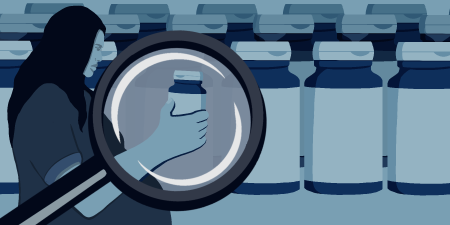Abstract
The Centers for Disease Control and Prevention’s National Health and Nutrition Examination Survey data reveal that consumption of over-the-counter vitamins, minerals, and herbals is widespread. Many clinicians, however, lack critical information about their patients’ use of dietary supplements. Particularly clinically relevant are supplement ingredients’ interactions with prescription medications, supplements’ questionable effectiveness in treating serious conditions, and their potential for causing harm. This article considers how clinicians might address dietary supplements’ safety, efficacy, and appropriate use with patients.
Case
Mr R visits Dr G to follow up on his type 2 diabetes after initiating basal insulin, mealtime insulin, empagliflozin, and metformin. Mr R explains that his metformin prescription expired, so he’s only taking empagliflozin, and that he prefers not to restart insulin because it gives him “brain fog.” Due to past pancreatitis, Mr R is not a candidate for glucagon-like peptide-1 receptor agonist treatment. Mr R states that he’d like to control his diabetes by modifying his diet, and he also expresses interest in taking a blood sugar control product he found at a nutrition store, which is labeled as containing cinnamon, chromium, bitter melon extract, gymnema, zinc, and a B-complex. Mr R’s most recent hemoglobin A1C is 8.6% (diabetic range) and his renal and liver function test results are normal. Dr G wonders how to respond to Mr R.
Commentary
Mr R’s case is not atypical in the management of chronic disease states. In practice, patients report using dietary supplements for a variety of reasons, including cultural or traditional family beliefs, conviction that dietary supplements promote a healthier way of living, or the belief that dietary supplements are a safer, more natural way of healing diseases than pharmaceutical agents. However, “safer” and “more natural” cannot be validated when comparing dietary supplements to prescription medications. Dietary supplements are regulated under the general umbrella of foods, not drugs.1 The Dietary Supplement Health and Education Act (DSHEA) of 1994 defines a dietary supplement as a product taken with the intent to supplement the diet and as including one or more of the following ingredients: vitamins, minerals, herbs or other botanicals, amino acids, or other substances.1 Since herbal supplements are considered dietary supplements that contain one or more herbs,2 the term dietary supplement in this article will include herbal supplements.
Based on the most recent Centers for Disease Control and Prevention National Health and Nutrition Examination Survey data, approximately 58% of the surveyed US adult population (aged 20 years and older) reported using a dietary supplement in the past month.3 The use of dietary supplements increased with age; the survey report noted that almost 25% of those surveyed over the age of 60 took 4 or more supplements.3 The most common dietary supplements reported included multivitamin-mineral supplements, vitamin D, and omega-3 fatty acid supplements.3 For many clinicians, conversation about supplements might seem easy when patients report taking a multivitamin, calcium supplement, or vitamin D, for each of which there is sufficient data to demonstrate improved overall health or disease management. Conversation becomes more difficult when clinicians are uncertain or skeptical of available scientific data about safety, efficacy, and regulatory oversight of supplements containing herbal ingredients.
Regulation of Dietary Supplements
Practitioners might mistrust dietary supplements due to perceived insufficient regulation of these agents. Unlike drugs, dietary supplements are not approved by the US Food and Drug Administration (FDA) for safety and efficacy. In fact, dietary supplements with ingredients sold in the United States before October 15, 1994, do not require FDA review for safety prior to marketing because these ingredients are presumed safe based on previous use in humans.1 For a new supplement or ingredient not marketed prior to October 15, 1994, the FDA must be notified by the manufacturer of the intent to market the product and provide information on how it determined that the product is safe for human use.1
Moreover, unlike prescription medications, dietary supplements cannot be labeled or marketed with claims of treating, diagnosing, preventing, or curing a disease.1 However, dietary supplements can be labeled with a health, nutrient content, or structure/function claim. For these claims, the DSHEA requires a “disclaimer” that the FDA has not evaluated this claim. Once a dietary supplement is available on the market, the FDA only restricts the use of or removes the product after it has been proven that the product is unsafe or misbranded (ie, labeled falsely or in misleading way).1 At no point in the process does the FDA address product efficacy. The FDA does expect manufacturers of dietary supplements to use current good manufacturing practice (CGMP) and guarantee the identity, purity, strength, and composition of their product,1 but it does not require standardization to ensure batch-to-batch consistency of the product. However, there is a loophole in that CGMP regulations require only the total amount of a proprietary blend to be stated on the label, with ingredients of the blend listed in order of predominance by weight.4 This labeling requirement allows manufacturers to change the actual amount of each ingredient in the blend without that information being conveyed to the consumer or FDA. Potentially this could be both a safety and efficacy concern.
Discussing Supplements With Patients
Advising patients about supplement use. To compile a complete medication list for each patient, practitioners should ask about use of prescription medications, over-the-counter medications, vitamins and minerals, and herbal supplements at each visit. Some patients will readily disclose the use of dietary supplements, but others might be more reluctant to provide this information. There are 3 common reasons patients do not disclose the use of complementary and alternative medicine to practitioners: (1) the practitioner did not ask, (2) a belief that the practitioner did not need to know, and (3) past or potential discouragement of use by practitioners.5 Thus, practitioners’ first step should be to inquire about past, current, or potential use of dietary supplements. Shared decision making is key in advising patients on use of these products.
Efficacy. If a patient is using or intends to use a dietary supplement, the next step is to determine if the product is potentially effective and if the product is safe for this patient. For some products, sufficient data on efficacy exists for specific indications; however, this is not true of all products or all indications. This assessment can be time-consuming, particularly when a patient takes multiple supplements with multiple ingredients. Clinicians might consider referring patients to pharmacists to evaluate the safety and efficacy of dietary supplements in more complex cases or when there are multiple ingredients that need consideration.
When evaluating a product such as Mr R’s for efficacy, clinicians should consider the intended purpose of the product and extant data supporting that purpose. Although the FDA does not require efficacy data, there are resources available to guide practitioners on potentially effective agents for the intended use. The Natural Medicines Comprehensive Database6 (available by subscription) is an excellent resource for reviewing available information on effectiveness of dietary supplements. Based on this resource, all the ingredients in Mr R’s product have some data supporting their glucose-lowering effects (see Table); thus, it might be effective. The practitioner should also ensure that the amount per serving (dose) of ingredients used in the product and the doses taken are within the recommended range and advise against products that contain a proprietary blend when the dose of each ingredient in the proprietary blend is not available, as it becomes difficult to assess if the product contains a therapeutic, excessive, or insufficient dose of each ingredient.
| Ingredient | Effectiveness for type 2 diabetes |
Safety | Common or significant antidiabetes drug-supplement interactions |
|---|---|---|---|
|
Cinnamon |
Possibly effective: mixed evidence of effectiveness in improving glycemic control; best evidence from cassia cinnamon (120 mg to 6 g daily for 4-18 weeks) | Likely safe when consumed in amounts commonly found in foods, but causes hepatotoxicity in large doses | Possible additive effects with antidiabetes drugs |
| Chromium | Possibly effective: might improve glycemic control | Likely safe when used orally in appropriate amounts short-term (up to 1000 mcg daily for 6 months), but 3 reports of kidney damage (picolinate form) and at least 3 cases of hepatotoxicity | Potential for hypoglycemia with antidiabetes drugs |
| Bitter melon extract | Insufficient reliable evidence; might improve glycemic control | Possibly safe as a powdered agent (0.5-12 g daily for up to 16 weeks). Insufficient data on long-term use and should be avoided in patients with G6PD deficiency | Increased risk of hypoglycemia with antidiabetes drugs |
| Gymnema | Insufficient reliable evidence; might improve glycemic control in combination with other glucose-lowering agents | Possibly safe when used orally and appropriately (200 mg 2 times daily for up to 20 months) | Possible increased risk of hypoglycemia with antidiabetes drugs |
| Zinc | Possibly effective; might improve glycemic control | Likely safe when used orally and appropriately (no more than 40 mg daily) | Not applicable |
|
aAdapted from Natural Medicines.6
|
|||
Safety. To address safety, practitioners must consider if there is a potential drug-supplement or disease-supplement interaction. Patients considered at increased risk of interactions include those with chronic diseases who take multiple medications, elderly patients, pediatric patients, pregnant women, patients with poor nutritional status, and patients with poor overall health.7 Several resources can aid in determining the safety of dietary supplements.6,8,9,10 As illustrated in the Table, the Natural Medicines database provides information on the safety of supplements, including for specific disease states or conditions and in interactions with medications.6 The National Institutes of Health (NIH) Office of Dietary Supplements Fact Sheets website provides basic information about dietary supplements and their ingredients and is written for consumers as well as practitioners.8 It also provides up-to-date information on emerging topics, such as ingredients touted for the treatment or prevention of COVID-19. Based on the available resources, Mr R’s product appears to be safe other than the risk of hypoglycemia when combined with other glucose-lowering agents (see Table).
Purity. With multiple dietary supplements available to consumers, consideration should be given to the purity of the product. The FDA maintains a list of tainted products marketed as dietary supplements that might result in dangerous drug interactions, have undeclared ingredients, or contain dangerous drug levels.9 Although manufacturers have been advised by the FDA of safety concerns, some of these products are still widely available through online marketplaces and social media. The most commonly available tainted products contain phosphodiesterase type 5 inhibitors, steroids, or sibutramine.9 Additionally, the FDA does provide a list of products, the ingredients of which it is further investigating.10 Being on the list does not mean that the product has been found unsafe but rather that further investigation is taking place. Lastly, as mentioned previously, in the absence of required standardization to ensure batch-to-batch consistency, the variability in the actual amount per serving of ingredients in a supplement can make accurate dosing difficult.
One way to promote confidence in the purity and manufacturing processes of dietary supplements is to look for the USP (United States Pharmacopeia) or ConsumerLab label. USP and ConsumerLab are independent organizations that voluntarily evaluate the quality of medications and dietary supplements.11,12 These independent third parties conduct a careful testing and auditing process using science-based quality standards, including federally recognized standards of quality, purity, potency, performance, consistency, and CGMP.
Conclusion
Mr R’s desire to use a dietary supplement for glycemic control is not unusual. Overall, as noted above, the ingredients in his product have data supporting the intended purpose and appear safe. However, it would be prudent to discuss with Mr R that, while there is evidence that a glucose-lowering effect might be possible with this product, it likely cannot replace all of his diabetes medications. This is an example of shared decision making. If the dietary supplement proves effective, Mr R will feel he has found a product he is willing to take that effectively lowers his glucose levels and does not have established safety concerns. Conversely, if the dietary supplement proves ineffective, the practitioner should discuss the initiation of traditional medications for glycemic control.
Overall, when a patient is using or has intentions to use a dietary supplement in place of a prescribed agent, practitioners should approach this decision from the standpoint of the safety and efficacy of the agent. If the product appears safe and has some data supporting its efficacy for the intended use, practitioners should support the patient’s decision to trial the agent for a specified time period. If the agent’s safety or efficacy is unknown, practitioners should discuss these concerns with the patient and consider if there might be an appropriate dietary supplement alternative for the intended purpose. They should also provide resources to their patients, such as the NIH Office of Dietary Supplements fact sheets. Collaborating with a pharmacist might serve as the best approach to collecting and verifying information on safety and efficacy of dietary supplements, particularly when there are time constraints in providing optimal patient care or in complex cases.
References
-
Background information: dietary supplements. Office of Dietary Supplements, National Institutes of Health. Updated March 11, 2020. Accessed June 6, 2021. https://ods.od.nih.gov/factsheets/DietarySupplements-Consumer/
-
Dietary and herbal supplements. National Center for Complementary and Integrative Health, National Institutes of Health. Updated February 2020. Accessed June 6, 2021. https://www.nccih.nih.gov/health/dietary-and-herbal-supplements
-
Mishra S, Stierman B, Gahche JJ, Potischman N. Dietary supplement use among adults: United States, 2017-2018. Centers for Disease Control and Prevention; 2021. NCHS data brief 399. Accessed December 8, 2021. https://www.cdc.gov/nchs/products/databriefs/db399.htm
-
Small entity compliance guide: statement of identity, nutrition labeling and ingredient labeling of dietary supplements. Docket No. FDA-2020-D-1959. Center for Food Safety and Applied Nutrition, US Food and Drug Administration. January 1999. Accessed April 28, 2021. https://www.fda.gov/regulatory-information/search-fda-guidance-documents/small-entity-compliance-guide-statement-identity-nutrition-labeling-and-ingredient-labeling-dietary
- Jou J, Johnson PJ. Nondisclosure of complementary and alternative medicine use to primary care physicians: findings from the 2012 National Health Interview Survey. JAMA Intern Med. 2016;176(4):545-546.
-
Natural MedicinesTM. Accessed October 12, 2021. https://naturalmedicines.therapeuticresearch.com/
-
Terrie YC. Drug-supplement interactions: patient awareness is key. Pharmacy Times. October 8, 2013. Accessed October 13, 2021. https://www.pharmacytimes.com/view/drug-supplement-interactions-patient-awareness-is-key
-
Dietary supplement fact sheets. Office of Dietary Supplements, National Institutes of Health. Accessed December 13, 2021. https://ods.od.nih.gov/factsheets/list-all/
-
Tainted products marketed as dietary supplements. US Food and Drug Administration. Accessed October 5, 2021. https://www.accessdata.fda.gov/scripts/sda/sdnavigation.cfm?sd=tainted_supplements_cder
-
Dietary Supplement Ingredient Advisory List. US Food and Drug Administration. Updated October 29, 2021. Accessed March 8, 2022. https://www.fda.gov/food/dietary-supplement-products-ingredients/dietary-supplement-ingredient-advisory-list
-
Dietary Supplements Verification Program. USP (United States Pharmacopeia). Accessed May 29, 2021. https://www.usp.org/verification-services/dietary-supplements-verification-program
-
ConsumerLab.com®. Accessed May 29, 2021. https://www.consumerlab.com/



